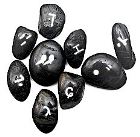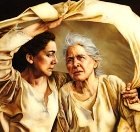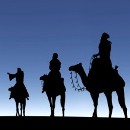Did Bible people believe in magic?
The answer is: yes, but not officially. Magic was condemned by the prophets. They taught that the only sure protection against evil was belief in the one God and obedience to His will.
The Law of Moses
- forbad all magic practices. Leviticus 19:26 says bluntly ‘You shall not practice witchcraft’; Deuteronomy 18:10-11 goes into more detail, saying ‘No-one shall be found among you who makes a son or daughter pass through fire (this meant human sacrifice), or who practices divination, or is a soothsayer, or an augur, or a sorcerer, or one who casts spells or who consults ghosts or spirits, or who seeks oracles from the dead.’
- made witchcraft a capital offence. Exodus 22:18 says ‘You shall not permit a female sorcerer to live’) and
- rejected customs such as sacrificing to the dead.
That was the official line. Other nations might believe in magicians and sorcerers but, according to the prophets, Israel did not. In theory.
In practice, ancient customs lingered on.
Example 1
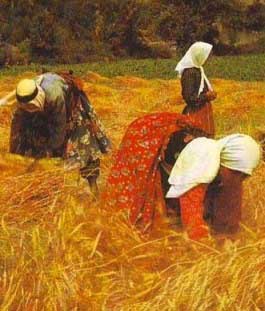 How do we know? Well, here’s an example:
How do we know? Well, here’s an example:
Leviticus 19:9-10 directs that at the time of harvest, the corners of fields, the gleanings of corn and the fallen grapes in vineyards had to be be left for the poor and the foreigner (this is how Ruth meets Boaz in the Book of Ruth).
This probably came from an ancient custom, where each year some of the harvest was left in the fields. Why? To feed the spirits of the grain crops, so they would be strong and grow well in the following year.
Example 2
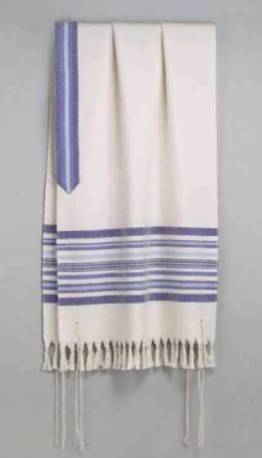 Similarly, people were commanded to leave fringes ‘tzitzit’ intertwined with blue threads on the corners of their garments (see at right).
Similarly, people were commanded to leave fringes ‘tzitzit’ intertwined with blue threads on the corners of their garments (see at right).
Originally this was to frighten off evil spirits, but now it is seen as as a reminder of the words of God.
Example 3
Jews also placed (and continue to place) a ‘mezuzah’ containing a parchment scroll bearing a prayer on their door-posts (see at right). 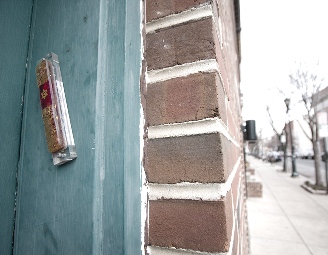
This is a continuation of a far older custom, intended to protect a house and its inhabitants against any type of evil. These days it is seen as a reminder of their living God.
Magicians in the Bible
There were various ways of describing someone who practised magic:
- A sorcerer, or practitioner of witchcraft, was called a kashaf (Exodus 7:11 says ‘Then Pharaoh summoned the wise men and the sorcerers; and they also, the magicians of Egypt, did the same by their secret arts’; 22:18 says ‘You shall not permit a female sorcerer to live’; Deuteronomy 18:10 says ‘No one shall be found among you who makes a son or daughter pass through fire, (this meant human sacrifice) or who practices divination, or is a soothsayer, or an augur, or a sorcerer, or one who casts spells, or who consults ghosts or spirits, or who seeks oracles from the dead’; Jeremiah 27:9).
- ‘Lahag‘ or soothsaying is used in the Bible for the one who chants or whispers incantations. It means specifically charming serpents (Psalms 58:5)
- ‘hober‘ or charmer (Isaiah 47:9, 12; Psalms 58:5) refers to the use of magic amulets and charms
- in the book of Daniel, the word ‘Chaldeans’ is used both in an ethnic sense and to designate a certain class of specialists in magic and witchcraft
- the New Testament refers frequently to magic and witchcraft (for example in Acts 8:9, or in Acts 11 13:6-8(Now a certain man named Simon had previously practised magic in the city and amazed the people of Samaria, saying that he was someone great. All of them, from the least to the greatest, listened to him eagerly, saying ‘This man is the power of God that is called Great’. And they listened eagerly to him because for a long time he had amazed them with his magic.’)
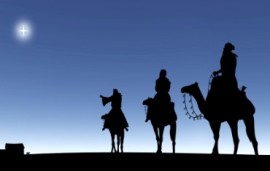
- the Magi, for instance (Matthew 2), were in fact an ethnic group from Media whose name, like that of the Chaldeans, became a technical term for a magician or astrologer. See more at the Magi, Wise Men, Jesus’ birth
Ancient magic – links
____________
© Copyright 2006
Elizabeth Fletcher

